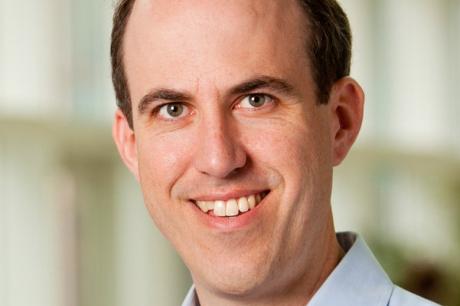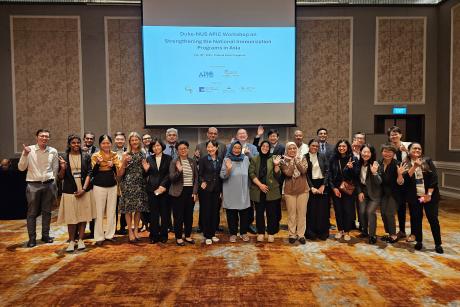Watch the full Feb. 5 Think Global event, "Lives on Pause: Implications of a U.S. Retreat from Global Health Funding," above.
Published February 6, 2025, last updated on February 7, 2025 under Commentary
Dorothy Dow, M.D., was on an 11-hour bus ride across Tanzania when she received news about the order from the U.S. State Department to freeze all spending on foreign aid programs. Dow, an associate professor of pediatrics and global health at Duke, was on her way to lead training to integrate a peer-led mental health intervention into routine HIV care for adolescents in several parts of the country, a pilot project funded by the U.S. Agency for International Development (USAID), one of the many federal programs impacted by the freeze.
“Two hours into the bus ride, I had to get off, call my team to tell them the news, and go back home,” Dow said during a Think Global event on Feb. 5 exploring the impacts of the foreign aid freeze and other recent actions taken during the first weeks of U.S. President Donald Trump’s term. “The ripples of this are huge. … It feels irresponsibly actioned by the U.S. government, and honestly it feels inhumane for those who are suffering.”
Four Duke experts on global health and foreign policy spoke during the event, hosted by the Duke Global Health Institute and moderated by DGHI director Chris Beyrer, M.D. All echoed Dow’s concern that the administration’s actions are irreversibly damaging U.S.-led global health efforts and putting lives at risk.
“There is absolutely room for reform in foreign aid. But the way this is being done right now is inefficient, counterproductive and destructive,” said Sarah Bermeo, Ph.D., an associate professor of public policy who studies the role of foreign aid in international development.
The halt on foreign aid stemmed not just from an executive order Trump signed on Jan. 20, which called for a 90-day review of all foreign aid programs, but the State Department’s broad interpretation of the order, noted Jirair Ratevosian, DrPH, a DGHI postdoctoral research fellow focusing on HIV prevention and treatment. The State Department ordered stoppages for both new and existing programs, allowing only a few exceptions for life-saving humanitarian aid.
“It’s perfectly reasonable to call for a review of foreign aid,” said Ratevosian, who previously served as interim chief of staff for the President’s Emergency Plan on AIDS Relief (PEPFAR), which provides antiretroviral medications for around 20 million people with HIV globally. “What transpired a few days after [the executive order] is what led to this cascading effect of panic, chaos, disruption and lives hanging in the balance.”
While additional waivers have been granted to allow PEPFAR to distribute medications, many global health programs are still not able to function because of restrictions on operational budgets and staffing, Ratevosian said. He noted, for example, that all USAID staff working in countries outside the U.S. have been ordered to leave, making it virtually impossible for thousands of health programs administered by the agency to resume service.
“Let’s just be incredibly clear about this. Freezing U.S. health aid overnight is the exact opposite of a well-managed, careful transition,” said Gavin Yamey, M.D., the Hymowitz Family Professor of the Practice in Global Health at DGHI.
Yamey, who directs the Duke Center for Policy Impact in Global Health, cited examples from the center’s research of dramatic changes in health when donors suddenly pull funding. When the Global Fund ended support of HIV prevention services in Romania in 2010, for example, HIV transmission rates among people who inject drugs, one of the vulnerable groups that had been covered by prevention programs, soared from 1 percent to 53 percent in four years.
The freeze on funds to control diseases such as malaria and tuberculosis may well produce the same result, Yamey said, noting that Uganda recently announced that it can no longer afford to provide bed nets and take other steps to prevent malaria from spreading.
"The result will inevitably be malaria resurgence, sickness and deaths, especially among children and pregnant women,” Yamey said.
Bermeo noted that U.S. foreign aid, which accounts for less then 1 percent of the overall federal budget, has long been seen by both Democratic and Republican administrations as directly benefitting U.S. national security and international diplomacy. She said the hasty, chaotic manner in which programs have been suspended will likely do significant long-term damage to U.S. interests abroad and give more power to China and Russia, which are already moving to aid countries impacted by a potential long-term loss of U.S. funding.
“Dismantling [foreign aid] in this way is not going to save money. It’s going to cost a lot of money, and it’s going to make the U.S. weaker,” said Bermeo, who expands on these views in an article published Feb. 5 on LSE, a site featuring academic analysis on current events.
While there are likely to be constitutional challenges to the freezes on foreign aid and USAID, the panelists said more threats to global health programs are likely to come. PEPFAR, for example, is operating on a one-year Congressional reauthorization that expires in March, and it’s unclear whether Congress will vote to extend the program in its current form.
Dow noted that in Tanzania alone, for each day that PEPFAR programs were unable to operate, 15,000 people living with HIV were prevented from accessing medications they need to stay healthy. It’s estimated that 30 babies were born each day with HIV infections that could have been prevented with PEPFAR-funded medications, she said.
"We’ve come so far with HIV treatment, and stopping PEPFAR really undermines and derails all of that progress," she said.


